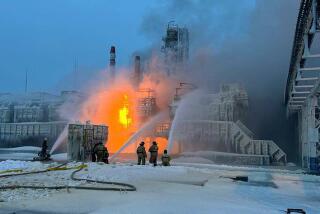Mortar Attack Kills 20 in Bosnia Market
- Share via
BELGRADE, Yugoslavia — Mortars fired on a Sarajevo market from the Serb-controlled hills surrounding the Bosnian city killed at least 20 people and injured 70 Wednesday, shattering hopes that Serbian aggression had been curbed by the threat of international sanctions.
The midmorning attack on the central Vase Miskina market occurred as the victims of a two-month siege of Bosnia-Herzegovina braved a day out of bunkers and hide-outs to stock up on food during a cease-fire arranged by Russian Foreign Minister Andrei V. Kozyrev.
The latest truce had inspired more confidence than a sheaf of earlier cease-fires because it was brokered by Russia, which shares Slavic heritage and the Orthodox faith with the Serbs.
It also was announced at a time when Serbian authorities in Belgrade were professing opposition to the bloodshed in Bosnia-Herzegovina in an apparent bid to fend off Western sanctions.
European Community nations Wednesday officially endorsed an array of punitive measures against the Serb-run remains of the Yugoslav federation that had been proposed the day before.
The 12-nation EC invoked a trade ban on Serbia and allied Montenegro--the last two republics still united in a rump Yugoslavia. However, the Western European alliance stopped short of imposing an oil embargo, deeding that issue over to the United Nations Security Council for debate.
Serbia in recent years conducted about half its foreign trade with EC countries, and the loss of that market will be particularly biting, now that trade ties with other former Yugoslav republics have been severed or disrupted by the Balkan conflict.
The measures are not expected to have immediate effect, despite the economic catastrophe that has saddled Serbia with hyper-inflation now estimated at 100,000% annually. Some foreign and local observers even speculate that the sanctions may backfire, hardening Serbian resolve not to cave in to Western pressure.
Serbia flourishes agriculturally and has good supplies of hydroelectric power, which should provide a cushion against serious hardship at least through summer.
The EC chose not to suspend all air, rail and ship traffic to Serbia and Montenegro. That move might have enhanced an already pervasive sense of isolation in the republics, but it would inconvenience only the small segment of society still affluent enough to travel.
An oil embargo would likely be more painful, cutting gasoline supplies to the more than 10 million Serbs and Montenegrins, most of whom own cars.
The EC sells Serbia only about 12% of the republic’s oil needs, making it incumbent on the main suppliers, such as China and Russia, to join in any embargo if the move is to be effective.
Turkey announced Wednesday that it has withdrawn its ambassador from Belgrade in response to attacks by Serbs in Bosnia, and Peru joined the growing list of nations affording diplomatic recognition to Bosnia.
Further international action may be spurred by Wednesday’s slaughter at the Sarajevo market, the most brutal attack on civilians in nearly two months of rebellion by heavily armed Serbs.
A Yugoslav army general in Sarajevo, Nedjo Boskovic, vowed to identify and punish those responsible for the attack, the Serb-controlled Tanjug news agency said.
“I cannot understand that such a monster could exist,” Tanjug quoted Boskovic as saying of the attackers.
More than 2,000 people--most of them Slavic Muslims--have been killed in Bosnia-Herzegovina since the majority of the republic’s voters backed independence in a Feb. 29 referendum. But many Serbs, who account for about 31% of Bosnia’s 4.4 million citizens, oppose the move that would politically sever them from Serbia.
More to Read
Sign up for Essential California
The most important California stories and recommendations in your inbox every morning.
You may occasionally receive promotional content from the Los Angeles Times.













